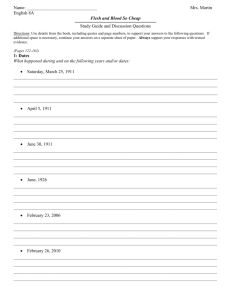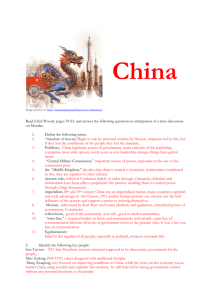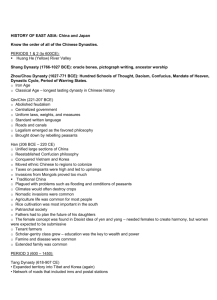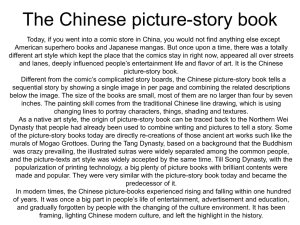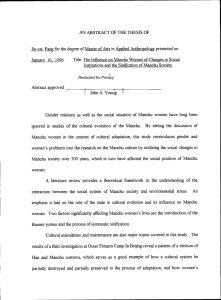Cause of the 1911 revolution
advertisement
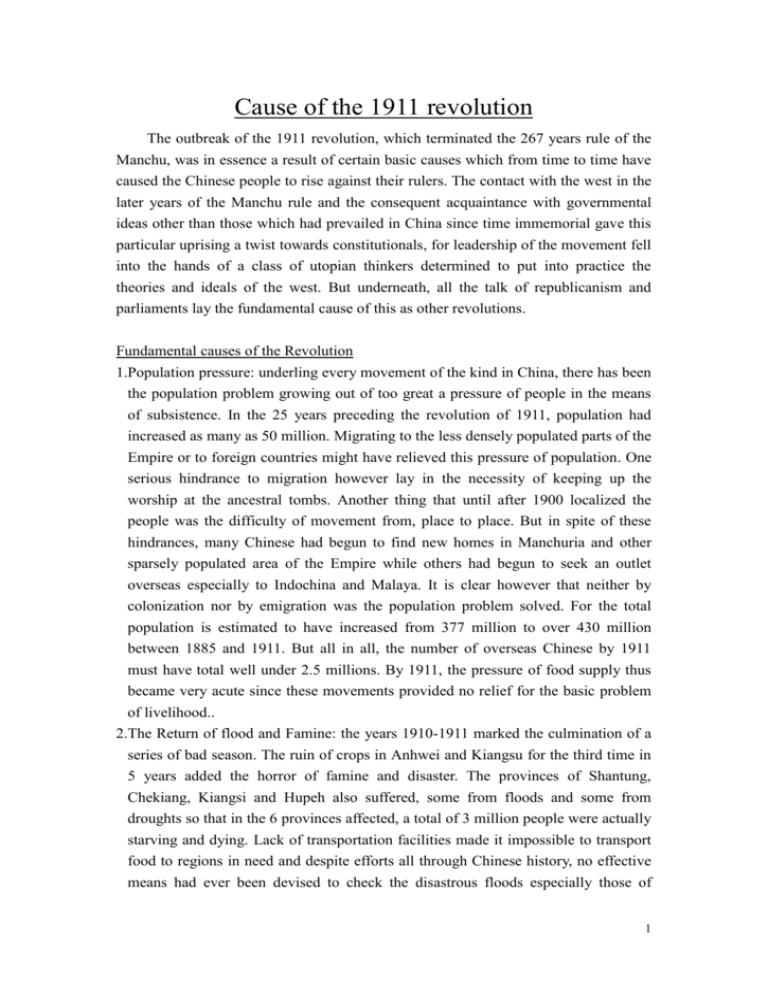
Cause of the 1911 revolution The outbreak of the 1911 revolution, which terminated the 267 years rule of the Manchu, was in essence a result of certain basic causes which from time to time have caused the Chinese people to rise against their rulers. The contact with the west in the later years of the Manchu rule and the consequent acquaintance with governmental ideas other than those which had prevailed in China since time immemorial gave this particular uprising a twist towards constitutionals, for leadership of the movement fell into the hands of a class of utopian thinkers determined to put into practice the theories and ideals of the west. But underneath, all the talk of republicanism and parliaments lay the fundamental cause of this as other revolutions. Fundamental causes of the Revolution 1.Population pressure: underling every movement of the kind in China, there has been the population problem growing out of too great a pressure of people in the means of subsistence. In the 25 years preceding the revolution of 1911, population had increased as many as 50 million. Migrating to the less densely populated parts of the Empire or to foreign countries might have relieved this pressure of population. One serious hindrance to migration however lay in the necessity of keeping up the worship at the ancestral tombs. Another thing that until after 1900 localized the people was the difficulty of movement from, place to place. But in spite of these hindrances, many Chinese had begun to find new homes in Manchuria and other sparsely populated area of the Empire while others had begun to seek an outlet overseas especially to Indochina and Malaya. It is clear however that neither by colonization nor by emigration was the population problem solved. For the total population is estimated to have increased from 377 million to over 430 million between 1885 and 1911. But all in all, the number of overseas Chinese by 1911 must have total well under 2.5 millions. By 1911, the pressure of food supply thus became very acute since these movements provided no relief for the basic problem of livelihood.. 2.The Return of flood and Famine: the years 1910-1911 marked the culmination of a series of bad season. The ruin of crops in Anhwei and Kiangsu for the third time in 5 years added the horror of famine and disaster. The provinces of Shantung, Chekiang, Kiangsi and Hupeh also suffered, some from floods and some from droughts so that in the 6 provinces affected, a total of 3 million people were actually starving and dying. Lack of transportation facilities made it impossible to transport food to regions in need and despite efforts all through Chinese history, no effective means had ever been devised to check the disastrous floods especially those of 1 Yellow River which from time to time caused great misery. When as in 1911, famine, flood and plague appeared simultaneously, there were sure to be thousands of people to whom life would not well-look more discouraging and who would willingly follow anyone who promised them relief from their suffers. These people thus furnished the material for a siderspread revolt. 3. Rising Taxation and official corruption: throughout China, discontent had also been around by rising taxes, expenses had been steadily increasing after 1900 because of new expenditures, made necessary by the Late Ching Reform programmer. These included the paying and equipping of the new army. The construction of new railways and the establishment of new educational, new industry. Moreover, the payments on the loans to meet the Japanese War indemnity of 1895 had to be made as did the much river payment on the Boxer indemnity of 1901. These absorbed almost the entire revenue and as a result, taxation became increasingly heavy and new charges had to be made. Moreover, when the Manchu demand the carrying out of reforms, the corrupt officials often made the required reforms an excuse for further extractions from the common people until to the average overserver the refrom policy seemed simply an excuse for new extortion. Had the Manchus possessed an efficient administrative machine capable of demonstrating the real benefits of reform, they might have postponed their downfall as it was. However, the Manchus confessed their weakness by avoiding the most necessary, but most different reform, the re-shaping of the official system. Rising taxation together with official squeeze thus increased the volume of discontent and dissatisfactory with the Ching dynasty. A Decadent dynasty (rise of nationalism): The Manchus had passed the Zenith of their power. The 19th century had produced no emperor who was a worthy descendent of Kang Ksi or Chien Lung. The two Anglo-Chinese wars, the Taiping Rebellion, the defeat at the hands of Japan, the scramble for concessions, the disastrous Boxer Upsizing, the dispute between Russia and Japan over Manchuria, all these events had served to associate the dynasty in the minds of the most Chinese with humiliation and failure. Anti-dynasty feeling was increased by the fact that the Manchus were descendents of a barbarian tribe which had conquered China and that they had their racial prejudice and had kept a privilege position in politics. As nationalism grows in China, it was almost inevitable directed against the ruling house on whose shoulders was laid the blame for the Chinese weakness. From 1860-1908, the real ruler of China was the Empress Dowager, Tsu Hsi. Her regency was, in general, a period of decline, but had she not occupied the position of power that decline would have been more rapid and disastrous than it was. In the closing years of her life, she adopted a policy 2 of modernization on western lines and her strong character had compelled a partial observance of her commands. On her death, the administration passed into the hands of a child emperor and a well-intentioned, but incompetent regent. With Tzu Hsi’s strong hand removed there was little hope for the dynasty. In the face of external pressure and growing internal dissatisfaction, the political vacuum at Peking only meant that the end of the Manchu rule could not be far off. As J.O.P. Bland in his “recent Events and Present Politics in China ”has summed up the situation “If the Manchus have lost the dragon throne, it is not because they were tyrants and despots, but because they were inefficient, ignorant, and effete, because they tribute of sovereignty was converted by a body of men better organized, more intelligent and more determined than themselves, because the advance of popular education, the work of the vernacular press and above all repeated foreign encroachment and invasions had impressed upon the restless intelligence of the Cantonese. The fact that the Manchus were no longer to be feared.”” Who were these men that were better organised, more intelligent and more determined than the Manchus? They were the followers of Sun Year-sen. Influences of the revolutionary groups: Ever since his exile from China in 1895, Sun had been gathering funds and supports for a replicas revolution against the Manchus and the Chinese students who came to Japan grew most receptive to his propaganda. Gradually the Chinese students in Japan formed a number of revolutionary secret societies, which added to the many groups of an anti-dynastic character of these various societies into one single organization, the Tung Meng Hium, thus assuring the cooperation and unity of the effort. The death of Kuang Hsu in 1908 robbed Kang Yu-Wei’s party of its objected. Had the regent been wise enough to pardon Kang and Liang as supporters, a considerable group of the disaffected might have been won back to the aid of the Manchus. But Prince Chun with his usual lack of political wisdom failed to seize this opportunity and the majority of Kang’s followers passed into camp of Sun while the modern sage himself devoted his energies to reform of Confucianism. The pronounced anti-dynastic propaganda in Japan was matched by a tiding tide of opposition to the Manchus at home. 3
